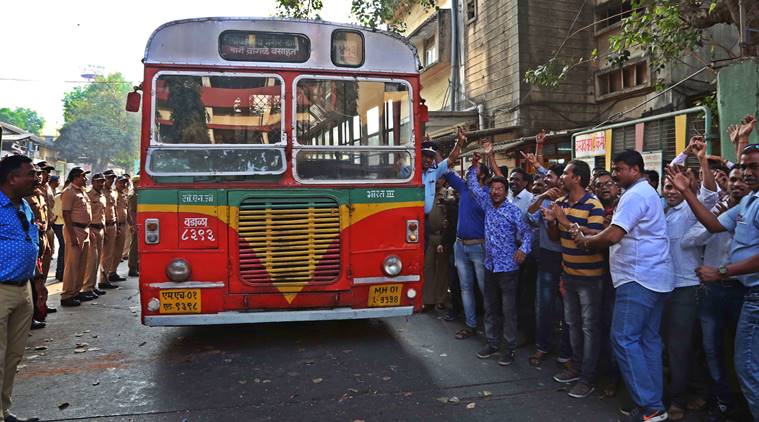The BEST (Brihanmumbai Electricity Supply and Transport) workers in India’s financial and commercial capital, Mumbai, went on a nine-day strike against low wages and privatization attempts. The strike reached a successful conclusion on January 16 as the management agreed on an interim pay hike for 15,000 employees, effective from this month. The BEST Sanyukta Kamgar Kruti Samiti (BSKKS), a joint action committee of different BEST unions, lead the strike.
BEST is a public sector undertaking, based in Mumbai, responsible for providing electricity and operating the city’s buses,one of the largest fleet of buses in India. It also runs ferry services between three adjoining cities of Mumbai. As part of the strike, almost 33,000 workers in the transport wing and over half of the 8,000 workers in the electricity wing refused to work.
The strike began with the nationwide general strike in India on January 8-9, and went on to become the longest strike in BEST’s history.
The main demands of the BEST workers include a hike in wages, payment of the long due Diwali bonuses and the merging of BEST with Mumbai’s civic body, Brihanmumbai Municipal Council (BMC).
BMC is India’s richest civic body. It was allocated a budget of 27,000 crore rupees in the financial year 2017-18. By bringing BEST under the ambit of BMC, the workers feel that they would be able to get better pay and benefits as well as the transport services would benefit by a greater influx of resources.
Currently, BEST’s junior grade staff receives a salary of less than 15,000 rupees per month, which is lower than what a grade-four BMC employee gets. The BSKKS is demanding an increase in wages to 22,000 rupees for the junior staff, making their salaries equal to grade-four employees of BMC.
The BEST was once a premier public transport service in India, serving as a model for other cities. But years of neglect and disinvestment have left it in a deplorable condition, leading to commuters shifting to other modes of transport.
The mishandling of the service has led to a 21% reduction in the bus fleet size and a discontinuation of 18% of the routes in the last five years. 7,200 staff positions have also been scrapped, causing a further unavailability of human resources to operate the service.
The service has also been affected by the rapidly rising number of private vehicles on Mumbai’s roads, which has made the buses slow and unpunctual.
Moreover, there has been considerable pressure on BEST to make profits, which is unreasonable to expect of a public transport service. Since its inception, the transport service functioned well due to its cross-subsidy structure. Since the body consists of both electricity and transport, whatever losses the transport wing incurred were subsidized by the electricity wing.
In 2003, an order by India’s central government barred such cross-subsidies, causing the transport division’s losses to swell.
Instead of receiving support from other sources of public revenue, BEST is given loans which it is expected to pay back with a 10% interest. Anil Kokil, chairman of the BEST committee, was quoted saying in 2017, “We have already paid back Rs 1,100 crore of the loan plus another Rs 550 crore of the interest, but we need to keep taking short-term loans to be able to do that and to run our operations.”
Currently, BEST is in a debt of 2,500 crore rupees, unable to pay salaries and other benefits to workers in time.
Citing the losses as a reason, the BEST management has been pushing for reforms which will only cripple the service further. This includes a hike in fares, more closure of bus routes and privatization of operations.
These ideas have been met with widespread opposition. The increase in fares has already led to a drop in ridership, making it unaffordable for the poorest sections of the society. Transport experts wrote to Mumbai’s municipal commissioner in August 2017 saying, “Fare hikes will simply drive more commuters out of buses and into private modes of transport, which is harmful for the city. The poorest will simply have to walk longer distances, or lose employment.”
Privatization will place a further focus on profits, which would increase the fares and reduce workers’ wages and benefits.
The striking workers faced various threats, with the BEST management going so far as sending letters to the workers demanding they evict the houses allocated to them. Despite providing the required advance notice about the strike, the Maharashtra Essential Services Maintenance Act, 2011 was invoked by the Bombay High Court a night before the strike began, making it illegal.
“As you have participated in the illegal strike, you are in unauthorized occupation of the tenement allotted to you. You are, therefore, called upon to vacate the aforesaid tenement and hand over the peaceful and vacant profession of the aforesaid tenement, failing which eviction proceedings will be initiated against you,” said the letter.
However, after the strike was called off, the state government said it will not take any punitive action.
The strike is estimated to have affected around 2.7 million commuters daily. However, the poor conditions of the workers, and the deteriorating state of the bus services, have brought sympathy from the city’s residents.
A citizen’s forum called Aamchi Mumbai, Aamchi BEST (Our Mumbai, Our BEST) is fighting for the workers’ rights and opposing the attempts of privatization and cut downs in the public transport services.
The forum has proposed an expansion of routes, lowering of the minimum bus fare and the immediate merging of BEST with the BMC.
Vidyadhar Date, one of the founders of Aamchi Mumbai, Aamchi BEST, told Peoples Dispatch that “Now the main task is for people to exert pressure on the government. The strike may be over, but we have to maintain pressure since the government has been neglecting public transport all these years.”





